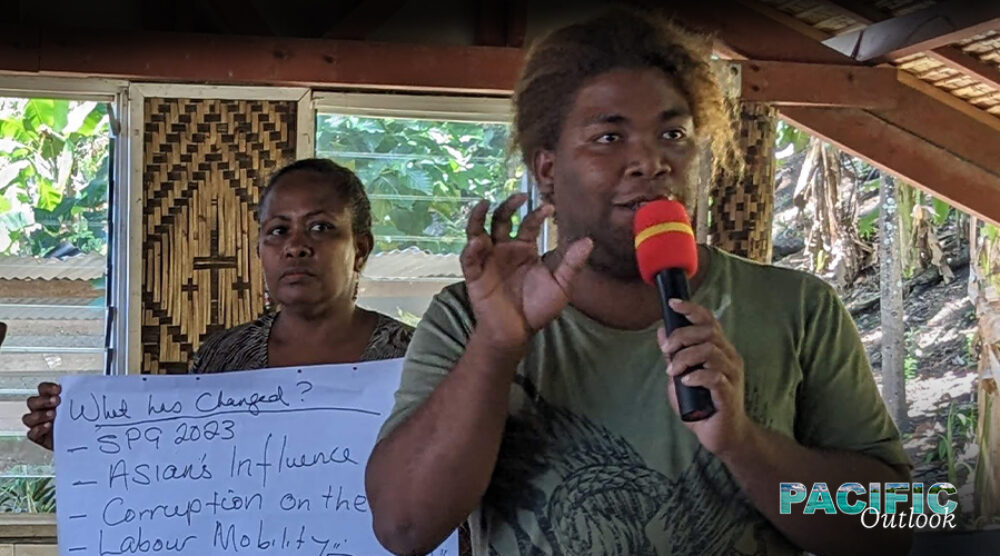In 2019 I convened a team of local and Australian researchers (led by Griffith’s Tess Newton Cain) who brought together the views of people from Fiji, Solomon Islands and Vanuatu for the Whitlam Institute in Pacific Perspectives on the World. Despite some local variation, the research findings were remarkably consistent in their emphasis on the importance of quality relationships, Pacific values, norms, and culture for the Pacific and in their assertion that while Australia is important, valued, and respected, it should not assume it is always the first choice of Pacific countries. They will work with many partners to realise their aims.
The research recommended that Australia open up to the Pacific and develop deep Pacific literacy. It also suggested that Australia needs to act at home by responding to climate change, overcoming Indigenous disadvantage, and stop presenting an overwhelmingly white face to the world.
Our intention to report back to those who gave us their time and their ideas—modelling what we proposed—was stymied by COVID. It was only in 2023 that I could honour this intent, with a report back in Solomon Islands.
On 20 April 2023, I joined my research partner Development Services Exchange and local consultant Melinda Kii for a seminar in Honiara. Together with some of the original research participants, other civil society leaders and diplomatic personnel, we discussed the research findings and explored together some of the things that may have changed since 2020. Were the findings still valid?

The short answer to the latter question was an emphatic yes. Solomon Islands people still take pride in their resilient culture and responsibility for the well-being of their homeland. They still value leadership and good government (and would like to see more of it) and continue to cast appreciative yet critical eyes on the country’s international relationships. Blackbirding was part of the family history of several participants. Australia was seen to prioritise its own national security at the expense of others—its visa application processes continue to cause frustration, expense and even trauma.
On COVID, the participants were more excited by its positive effects than concerned about its economic or health costs as the evacuation of foreign diplomats, contractors, NGO personnel and consultants had enabled local people to step up. Local embassy staff ably represented their mission to government. Talented local consultants filled the spaces left by their international counterparts. These responsibilities have so far been maintained now that the expats are back, but these moments of localisation are not yet a clear trend.
Participants observed that Australia’s engagement is improving. Though not as significant for Solomon Islands, the opening of the kava market might be a sign of more to come. Thousands more young Solomon Islanders are travelling to Australia under its labour mobility schemes. The workshop participants appreciated the deft regional diplomacy of Australia’s foreign minister. Even if the details of Australia’s involvement remained unclear, they recognised that its less flashy aid means that the country’s contribution is not always evident.

There are new problems. Everyone was concerned about the increase of corruption and the deferment of the national election to 2024. Participants reported feeling increasingly at the mercy of geopolitics and that this was reaching the provinces and felt as though the world was becoming less secure. But it’s worth noting that while they noted marked differences between China and Taiwan, Chinese engagement wasn’t considered a bad thing in itself. Participants were concerned about Chinese influence but felt that it is ultimately another relationship to be negotiated. Some even suggested that the switch to China was a mark of Solomons empowerment. The very visible China-built sports infrastructure for the coming Pacific Games that dominates the city surrounds speaks to this: it’s impressive and exciting but people remain sceptical.
People are looking at the Pacific Games in Honiara later this year as hopefully a moment of national pride and solidarity. More women are in parliament (though still there is a long way to go) and international interest in the country is growing, as shown for example by the reopening of the US Embassy. This last also raised a question: why is the world so interested in us?
Overall, people continue to be concerned about the gap between where they want the country to go and where it is headed. They have a clear idea of the former but are very unsure of the country’s current trajectory. How to bridge that gap?
A senior civil society leader offered his own take: “We are told that we are heading to prosperity, but we have more problems coming up. We need Australia and China, and their money—but we really need more money circulating around the country. We need to change our skills, our knowledge and education. We need more Solomon Islands scientists to unlock the secrets and potential of our country, to find the medicines in the forest. If we can use our own resources like this, we won’t need to rely on you.”
We will keep talking.
James Cox is the Executive Director of Peacifica, which engages in research and advocacy on peacebuilding and related matters in the Pacific.








